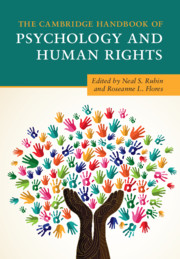Book contents
- The Cambridge Handbook of Psychology and Human Rights
- The Cambridge Handbook of Psychology and Human Rights
- Copyright page
- Dedication
- Contents
- Figures
- Tables
- Boxes
- Contributors
- Acknowledgments
- The Core International Human Rights Instruments and Their Monitoring Bodies
- Universal Human Rights Instruments
- Sustainable Development Goals
- Glossary of United Nations and Psychology Acronyms in the Handbook
- Introduction
- Part I History of Human Rights
- Part II The Intersection of Psychology and Human Rights
- Part III Contemporary Issues in Psychology and Human Rights
- 12 Mental Health and Human Rights
- 13 Cultivating Our Common Humanity
- 14 From Refugees to Immigrants
- 15 UN Convention on the Rights of the Child and the Sustainable Development Goals
- 16 The Global Contributions of Psychology to Understanding and Addressing the Non-negotiability of Human Dignity and Health Equity
- 17 Human Rights and Psychology from Indigenous Perspectives
- 18 Human Trafficking
- 19 Human Rights Seen through a Cultural Lens
- 20 Human Rights and Well-Being of Older Persons
- 21 Reproductive Justice, Psychology, and Human Rights
- 22 Psychology and the Global Human Rights Agenda on Sexual Orientation and Gender Identity
- 23 Psychosocial Features of Movements That Have Advanced Human Rights
- 24 Principles of Care of Survivors of Organized Violence in a Global Society
- 25 Mental Health and Psychosocial Support in Humanitarian Settings
- 26 Children and Violence across the Life Span
- 27 Psychology and Human Rights in the Age of Genomics and Neuroscience
- 28 Behavioral Insights, Public Policy, and Human Rights
- 29 From Human Resources to Human Rights
- 30 Climate Change
- Part IV Teaching, Research, and Training in Psychology and Human Rights
- Part V Future Directions
- Index
- References
30 - Climate Change
A Challenge to Human Rights, Justice, Equality, and Human Well-Being
from Part III - Contemporary Issues in Psychology and Human Rights
Published online by Cambridge University Press: 02 October 2020
- The Cambridge Handbook of Psychology and Human Rights
- The Cambridge Handbook of Psychology and Human Rights
- Copyright page
- Dedication
- Contents
- Figures
- Tables
- Boxes
- Contributors
- Acknowledgments
- The Core International Human Rights Instruments and Their Monitoring Bodies
- Universal Human Rights Instruments
- Sustainable Development Goals
- Glossary of United Nations and Psychology Acronyms in the Handbook
- Introduction
- Part I History of Human Rights
- Part II The Intersection of Psychology and Human Rights
- Part III Contemporary Issues in Psychology and Human Rights
- 12 Mental Health and Human Rights
- 13 Cultivating Our Common Humanity
- 14 From Refugees to Immigrants
- 15 UN Convention on the Rights of the Child and the Sustainable Development Goals
- 16 The Global Contributions of Psychology to Understanding and Addressing the Non-negotiability of Human Dignity and Health Equity
- 17 Human Rights and Psychology from Indigenous Perspectives
- 18 Human Trafficking
- 19 Human Rights Seen through a Cultural Lens
- 20 Human Rights and Well-Being of Older Persons
- 21 Reproductive Justice, Psychology, and Human Rights
- 22 Psychology and the Global Human Rights Agenda on Sexual Orientation and Gender Identity
- 23 Psychosocial Features of Movements That Have Advanced Human Rights
- 24 Principles of Care of Survivors of Organized Violence in a Global Society
- 25 Mental Health and Psychosocial Support in Humanitarian Settings
- 26 Children and Violence across the Life Span
- 27 Psychology and Human Rights in the Age of Genomics and Neuroscience
- 28 Behavioral Insights, Public Policy, and Human Rights
- 29 From Human Resources to Human Rights
- 30 Climate Change
- Part IV Teaching, Research, and Training in Psychology and Human Rights
- Part V Future Directions
- Index
- References
Summary
Climate change poses a profound challenge to human well-being and the very foundation of social justice and human rights. This chapter applies a psychological lens to understand the impacts of and responses to climate change at individual and societal levels. We describe the dire mental health implications of climate change impacts, which cause trauma and uproot lives, destabilize socioeconomic and governance institutions, exacerbate inequality by disproportionately impacting vulnerable communities, and spur conflict through resource scarcity and uncertainty. We examine group identity and belonging dynamics driving societal conflict, including competition over resources; scapegoating, hate crimes, and exclusionary politics; ethnic and political strife surrounding immigration; and political polarization and the rise of far-right parties – and consider their human rights implications. We then explore the psychology of climate inaction. Our moral judgment system is unable to grapple with a psychologically distant threat whose cause is endemic to the foundation of society. Motivated reasoning processes, including identity-protective cognition and system justification, contribute to moral disengagement and resistance to direly needed systemic changes. We offer psychologically informed approaches for overcoming inaction through communication, solution design, and empowerment. Finally, we overview international climate efforts, with a focus on the UN 2030 Global Agenda for Sustainable Development.
Keywords
- Type
- Chapter
- Information
- The Cambridge Handbook of Psychology and Human Rights , pp. 443 - 458Publisher: Cambridge University PressPrint publication year: 2020
References
- 2
- Cited by

